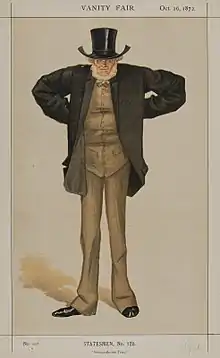Joseph Cowen (1800–1873)
Sir Joseph Cowen (10 February 1800 – 19 December 1873)[1][2] was a British Liberal Party politician and manufacturer.[3]
Sir Joseph Cowen | |
|---|---|
 Caricature of Cowen in Vanity Fair in 1872 | |
| Member of Parliament for Newcastle-upon-Tyne | |
| In office 12 July 1865 – 19 December 1873 | |
| Preceded by | Thomas Emerson Headlam Somerset Beaumont |
| Succeeded by | Thomas Emerson Headlam Joseph Cowen |
| Personal details | |
| Born | 10 February 1800 Greenside, County Durham |
| Died | 19 December 1873 (aged 73) Stella Hall, Blaydon-on-Tyne, County Durham |
| Resting place | St Paul's, Winlaton, County Durham |
| Nationality | British |
| Political party | Liberal |
| Spouse |
Mary Newton
(m. 1851, died) |
| Children | Five, including Joseph Cowen |
| Parent | John Cowen |
Family
Born in Greenside, County Durham, Cowen was the son of John Cowen. He married Mary Newton, daughter of Anthony Newton, in 1851; they had five children, including Joseph and John.[3][4]
Early life
Cowen was first apprenticed as a blacksmith in Winlaton, County Durham, at age 19, before later becoming a colliery owner, director of a shipping company, first secretary of the Blacksmiths' Friendly Society, and an original gentleman of the Four & Twenty.[4] He was a coal owner and firebrick and clay retort manufacturer, having inherited the Blaydon Burn from his father, where he joined his brother-in-law. Later, he became a Justice of the Peace for County Durham and an alderman for Newcastle-upon-Tyne.[3]
He was also a life member and chairman of the River Tyne improvement commission, helping make the river navigable for sea-going ships, for which he was knighted on 14 March 1872.[3]
Political career

Cowen demonstrated his political ambition early, protesting the Peterloo Massacre in 1819 and becoming an early member of the Anti-Corn Law League, as well as the National Political Union.[2]
He was elected Liberal MP with radical principles for Newcastle-upon-Tyne at the 1865 general election. While in Parliament, he advocated Church of England disestablishment and game law abolition, shorter parliamentary terms, and redistribution and equalisation of the franchise between counties and boroughs. He also refused to support Irish coercion and aided in the Cobden–Chevalier Treaty with France.[2] He held the seat until his death in 1873, when he was succeeded by his son at the ensuing by-election.[5][3]
Later life
Cowen died at his home, Stella Hall, Blaydon-on-Tyne, County Durham in 1873.[3] He was buried in St Paul's Churchyard in Winlaton.[4]
References
- Leigh Rayment's Historical List of MPs – Constituencies beginning with "N" (part 1)
- Bebbington, DW (April 2009). "Unitarian Members of Parliament in the Nineteenth Century: A Catalgoue" (PDF). Transactions of the Unitarian Historical Society Supplement. 24 (3): 58.
- W.F., Rae (23 September 2004). "Cowen, Joseph". Oxford Dictionary of National Biography (online ed.). Oxford University Press. doi:10.1093/ref:odnb/6494. (Subscription or UK public library membership required.)
- "Cowen Family". Winlaton & District Local History Society. Retrieved 6 March 2018.
- Craig, F. W. S., ed. (1977). British Parliamentary Election Results 1832-1885 (e-book) (1st ed.). London: Macmillan Press. ISBN 978-1-349-02349-3.